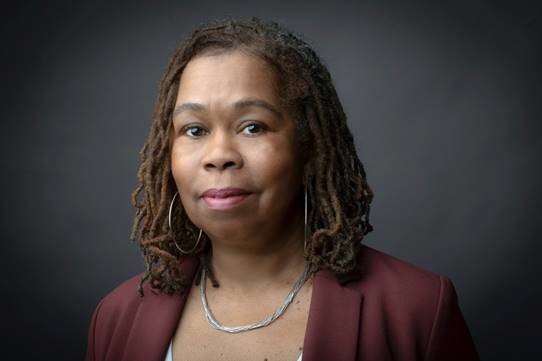Sign up for the daily CJR newsletter.
On Tuesday, voters in Chicago elected Lori Lightfoot mayor, the first time an African American woman has been chosen for the position. For Susan Smith Richardson, a longtime writer and editor at Chicago-based publications, it was the first local election in years she was not covering. “It’s tough,” Richardson said that evening. “I’m kind of sitting on my hands.”
It remains a busy time for Richardson as she prepares to leave her position as an editorial director at the Solutions Journalism Network, a national nonprofit, and relocate to Washington, DC. In May, she will become the first African American to take the reins as chief executive of the Center for Public Integrity, a move announced today by the nonprofit investigative journalism outlet.
Related: Exit Interview: Bill Keller on his time at The Marshall Project
Richardson’s journalism career spans three decades, and includes stints at the Austin, Texas-based American-Statesman; The Texas Observer, an investigative magazine; The Chicago Tribune; and The Chicago Reporter, an investigative outfit focused on issues of race and class, where Richardson served as editor and publisher. Her appointment to the Center for Public Integrity comes amid a broader changing of the guard in investigative journalism, as publications grapple with a lack of racial diversity and gender equality in their ranks. (Recent months have also seen the selections of Susan Chira, of The New York Times, to lead The Marshall Project, and Matt Thompson, of The Atlantic, to lead the Center for Investigative Reporting’s Reveal newsroom.)
“As journalists, we’re tasked today with having a much more complex, nuanced understanding of identity, representation, race, and—the big word—power,” Richardson says. Journalists are still playing catch-up, she said, but discussions about the intersection of such issues, as well as about whose stories are told and who’s doing the telling, present an opportunity. “The beauty of investigative journalism is that you have the ability to offer a complex take on big, systemic issues,” she says.
Richardson’s own taste for investigative work began in the late 1990s, when she was a columnist at the American-Statesman. In a series of pieces, she exposed how city policies at a time of rapid economic development were resulting in a significant loss of wealth among communities of color. Her work prompted fast responses by city officials. “To me, that was a turning point,” Richardson says. Years later, at The Chicago Reporter, Richardson presided over the outlet’s growth into the digital space, and its experimentation with a range of storytelling media, including data visualization. She considers the crowning achievement of her tenure a database and series of stories called “Settling for Misconduct,” which detailed the public legal costs incurred as a result of police misconduct.
Richardson, who sharpened her ideas about community-engagement through her work with local news outlets, hopes to apply those concerns at the Center for Public Integrity, which has historically focused on national politics but has more recently widened its aperture to include local politics and issues such as the environment and immigration. In particular, she says she will seek partnerships with those local newsrooms across the country aiming to boost their statehouse coverage, at a time when such coverage has dwindled.
It’s a characteristic approach for Richardson, who, in her position with the Solutions Journalism Network has worked to promote coverage of responses to social problems, rather than just the problems themselves. Following failures in Florida’s electoral system last November, for example, Richardson helped facilitate a series in the Miami Herald on solutions the state might implement in the run up to 2020. At a time when disinformation is rampant, and when disaffection with the media is high, a proactive orientation towards solutions is essential to re-winning public trust. “One of the things about participating in a democracy is believing that what you do matters,” Richardson says. “Without a sense of agency and a discussion of what the potential responses are to a problem, what are we really leaving audiences with?”
Richardson was happy with her work her work at Solutions Journalism Network and in Chicago. As she spent Tuesday running mundane errands —notifying the condo board of her departure, meeting with a realtor to discuss finding a renter—seeing voters lined up across the city had an emotional impact. “I realized I’m leaving a place that I’ve really considered home,” she says. “It was like the day was conspiring to make me sentimental.”
But, presented with the opportunity at the Center for Public Integrity, she didn’t need to think twice. “I thought, ‘Yes, this is the moment,” Richardson says. “‘It’s time to raise your hand and step up.’”
ICYMI: Journalists weren’t part of a conspiracy. They were doing their jobs.
Has America ever needed a media defender more than now? Help us by joining CJR today.







